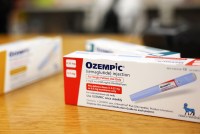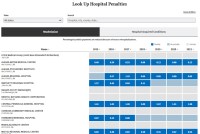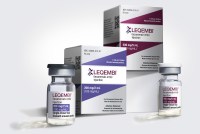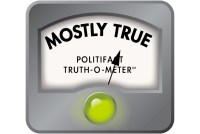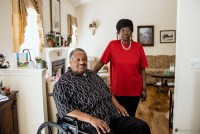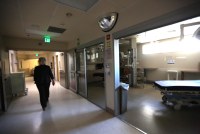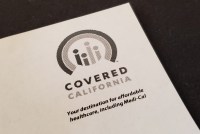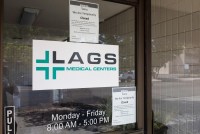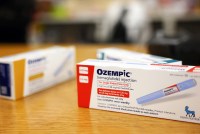Latest KFF Health News Stories
As Water Reuse Expands, Proponents Battle the ‘Yuck’ Factor
As drought and climate change threaten water supplies, municipalities around the country are ramping up water reuse efforts. But they have to overcome the “yuk” factor.
Survey: Americans Want Weight Loss Drugs Despite High Cost
A new poll reveals enthusiasm for a pricey new generation of weight loss drugs, but interest drops if users potentially have to deal with weekly injections, lack of insurance coverage, or a need to continue the medications indefinitely to avoid regaining weight.
Look Up Your Hospital: Is It Being Penalized by Medicare?
Each year, Medicare punishes hospitals that have high rates of readmissions and high rates of infections and patient injuries. Check out which hospitals have been penalized.
Más niños pequeños se intoxican al inhalar la nicotina líquida de los cigarrillos electrónicos
Miles de menores al año están expuestos a la nicotina líquida de los cigarrillos electrónicos, también conocidos como vapeadores. Para un niño pequeño, incluso unas pocas gotas pueden ser fatales.
‘Conscience’ Bills Let Medical Providers Opt Out of Providing a Wide Range of Care
Opponents of the wave of state legislation say the measures place health providers’ preferences over patients’ rights.
Doctors Sound Alarm About Child Nicotine Poisoning as Vapes Flood the US Market
Popular e-cigarettes lack packaging that stops kids from consuming the hazardous nicotine inside.
The Real Costs of the New Alzheimer’s Drug, Most of Which Will Fall to Taxpayers
The annual cost of lecanemab treatment quadruples if the expense of brain scans to monitor for bleeds and other associated care is factored in. The full financial toll likely puts it beyond reach for low-income seniors at risk of Alzheimer’s, experts say.
Repeating History: California County Plugs Budget Gap With Opioid Settlement Cash
State attorneys general vowed that opioid settlement funds — unlike the tobacco settlement of the 1990s — would go toward tackling the underlying crisis. But in Mendocino County, officials have found a way to use some of its share to help fill a budget shortfall — a throwback to what agreement architects hoped to avoid.
Be Aware: Someone Could Steal Your Medical Records and Bill You for Their Care
Consumers should know that this type of fraud can happen, whether from a large-scale breach or theft of an individual’s data. The result could be thousands of dollars in medical bills.
Sen. Sanders Says Millions of People Can’t Find a Doctor. He’s Mostly Right.
The Vermont senator sees beefing up the primary care workforce as a critical step in expanding Americans’ access to health care.
His Anesthesia Provider Billed Medicare Late. He Got Sent to Collections for the $3,000 Tab.
Medicare was supposed to cover the entire cost of his procedure. But after the anesthesia provider failed to file its claims in a timely manner, it billed the patient instead.
Bankrupt California Hospital Receives Lifeline From Adventist, Report Says
The Fresno Bee reports that Madera Community Hospital has reached an agreement with Adventist Health to take over the bankrupt facility and avoid liquidation.
What the Health? From KFF Health News: Another Try for Mental Health ‘Parity’
President Joe Biden is kicking off his reelection campaign in part by trying to finish a decades-long effort to establish parity in insurance benefits between mental and physical health. Meanwhile, House Republicans are working to add abortion and other contentious amendments to must-pass spending bills. Joanne Kenen of the Johns Hopkins Bloomberg School of Public Health and Politico, Anna Edney of Bloomberg, and Sarah Karlin-Smith of the Pink Sheet join KFF Health News’ chief Washington correspondent, Julie Rovner, to discuss these issues and more. Also this week, Rovner interviews KFF Health News’ Céline Gounder about her podcast “Epidemic.” The new season focuses on the successful public health effort to eradicate smallpox.
Los líderes legislativos habían presionado a Newsom, también demócrata, para que canalizara los ingresos fiscales hacia la reducción de los costos de la atención sanitaria.
Home Sweet Parking Lot: Some Hospitals Welcome RV Living for Patients, Families, and Workers
Medical and RV industry professionals say hospitals that offer RV parking are easing access to health care for some patients who drive long distances for treatment, like many rural residents.
Covered California to Cut Patient Costs After Democratic Lawmakers Win Funding From Gov. Newsom
California’s health insurance exchange will reduce how much some patients pay for care next year, including hospital deductibles, appointment copays, and prescription drugs. Lawmakers pressed Gov. Gavin Newsom to make good on a four-year-old pledge to use proceeds from a tax penalty on uninsured people to help people pay for treatment.
A un año del lanzamiento de la línea 988, ¿Funciona? ¿Qué desafíos enfrenta?
Esta línea fue diseñada con la idea de que las personas que experimentan angustia emocional se sintieran más cómodas buscando ayuda capacitada sin tener que llamar al 911.
Pain Clinic Chain to Pay $11.4M to Settle Medicare and Medicaid Fraud Claims
The owner of one of California’s largest chains of pain management clinics has agreed to pay California, Oregon, and the federal government to settle Medicare and Medi-Cal fraud allegations.
A Year With 988: What Worked? What Challenges Lie Ahead?
The 988 Suicide & Crisis Lifeline, a national hotline, reached its first-year milestone this month.
New Weight Loss Drugs Carry High Price Tags and Lots of Questions for Seniors
Although nearly 40% of Americans 60 and older are obese, Medicare doesn’t cover weight loss medications. Meanwhile, studies haven’t thoroughly examined new drugs’ impact on older adults.




